AMD Ryzen 3000 Post-Review BIOS Update Recap: Larger ST Gains, Some Gains, Some Losses
by Andrei Frumusanu on July 11, 2019 2:00 PM EST- Posted in
- CPUs
- Gaming
- AMD
- Zen 2
- Ryzen 3000
- Ryzen 3900X
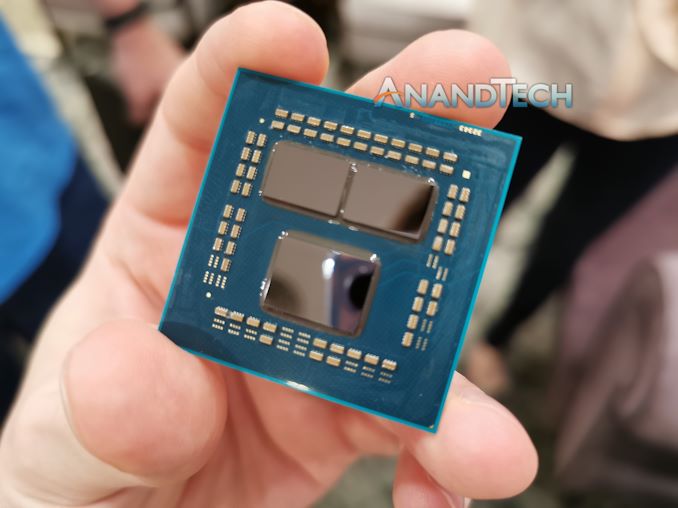
It’s been a long two weeks following our AMD-review-athon weekend, culminating 7/7 with our extensive coverage of the new Ryzen 3000 series CPUs, the new Radeon RX 5700 series Navi GPUs, as well as our complete overview of X570 chipset based motherboards.
Among the things that didn’t go quite as planned for in the hectic period leading up to Sunday was the matter of launch BIOSes. Always a thorny issue with new platform launches – BIOSes are often under intensive development right up until a new platform ships – we ended up in a situation where some boards had multiple BIOS versions floating around, with performance differences among them. And, while Moore's Law may be dead, Murphy's Law is alive and well, so of course the BIOS we ended up doing our initial Ryzen 3000 testing on was not the best BIOS for the platform.
So, we want to clarify the timeline of events for how we initially tested, what we’ve re-tested, and if and how the new BIOS behavior might change our original conclusion of the Ryzen 3000 series.
To go a little bit behind the scenes and talk about AMD's sampling process, the company had initially focused on outfitting reviewers with a selection of 4 different X570 motherboards. Among them was MSI's flagship, the MSI MEG X570 Godlike, which along with the MSI MEG X570 Ace, we already had in the lab for use in our first round of motherboard reviews. In a stroke of bad luck, our Godlike didn't make it to us intact, and we were never able get it to boot. So, following a further comedy of logistics issues that end with us receiving the CPUs only a few days before the launch date – and thus, without enough time to get a replacement board – we turned to our other X570 board, MSI's MEG Ace.
The MSI X570 MEG Ace, in turn, is still one of MSI's high-end motherboards and would normally be a good choice for a review board. The pitfall of using the Ace in this situation, however, is it wasn't one of the launch boards AMD was working with. So it didn't have an explicit and finely-tuned review BIOS like the Godlike had.
Ultimately, due to time pressure as well as unfamiliarity with the new Ryzen 3000 boosting behavior, we didn’t quite catch any issues of the board’s BIOS (or had been forewarned of issues) until we learned about and A/B tested a new public BIOS by MSI following the review article.
In a custom frequency test, we were able to verify that AMD’s new UEFI CPPC2 interface (Collaborative Power and Performance Control) wasn’t correctly working on the board as it did not boost to the higher frequencies, but most importantly it didn’t ramp up frequencies in the 1-2ms periods that AMD had promised, but rather in a quite slow ~500ms.
Re-testing and Updating Our Numbers
We’ve since been able to re-test both the Ryzen 9 3900X as well as the Ryzen 7 3700X, and have accordingly updated the review article with the new numbers. Furthermore, for everyone who has already read the initial review, we wanted to post a summary of the changes in the different workloads we saw on the 3900X:
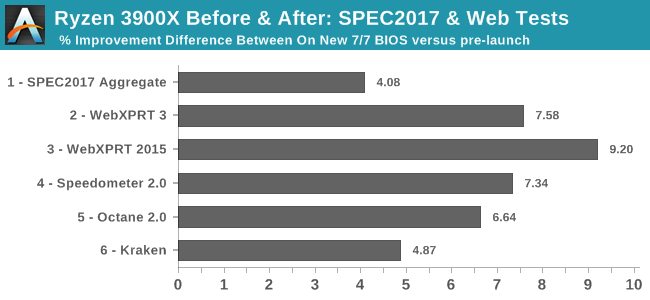
The biggest change was in tests that are bound by the performance of a single thread. These tests primarily have either multiple threads with just a single heavy thread, or just one thread period. Here we saw the effect of the new BIOS in action, allowing the CPUs to get nearer to their advertised maximum boost speeds, and we saw the biggest increases ranging from 4% in SPEC to 7-9% in the web tests.
Interactive tests such as WebXPRT particularly saw bigger changes as the frequency boosts was amplified by the faster frequency ramp-up speed, resulting in increases that were above the 5.8% higher boost frequencies we were able to verify.
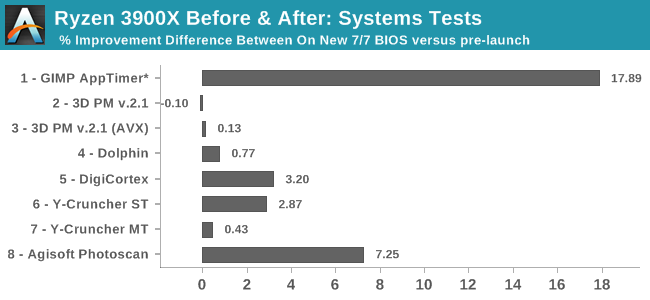
*Note: The 3900X AppTimer result is likely an outlier.
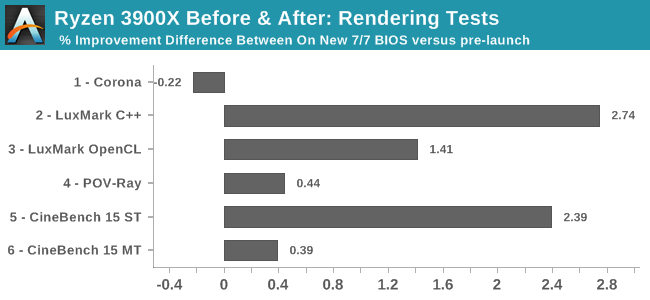
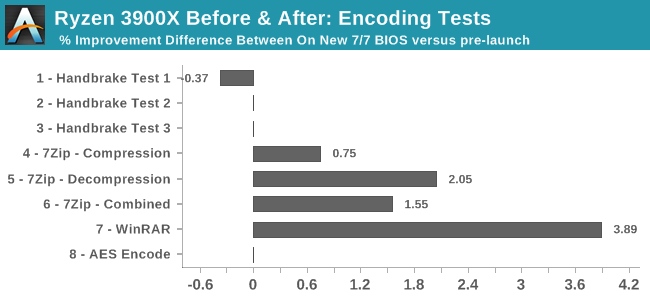
In the systems, rendering, and encoding tests, the performance changes and improvements strongly depended on the workload’s multi-threaded behavior. Agisoft’s Photoscan test behaves similarly to the web tests in terms of improvements, while heavy multi-threaded tests in the system suite didn’t see any changes. Some tests have single-threaded component bottlenecks in them which end up with improvements in-between, averaging around 2-3%.
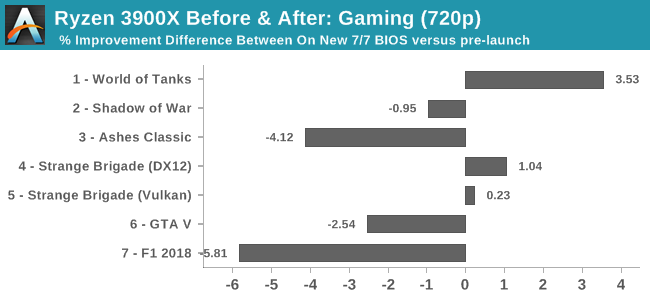
Gaming benchmark changes was a bit more varied in terms of results, particularly because we saw some larger degradations. The main reason here is that some titles while being multi-threaded, have only a limited number of threads. In these titles and situations where we’re not just purely bound by performance of a single large thread, it’s likely that we’re seeing the CPU clock slightly lower in the new release BIOS compared to what we tested originally. Our results were also consistent across multiple runs in this regard, so this isn't an artifact of normal run-to-run variation.
Overall Conclusion: Better Single-Threaded Results, But Same Positioning
Overall MSI's updated launch BIOS improved our original numbers the most in areas where the new Ryzen 3000 already excelled at: office and productivity applications. Particularly exclusive single-threaded workloads saw a larger boost which makes the new Zen 2 all the more impressive. Meanwhile the toss-up in the gaming results seems to point out that there’s still improvements to be made in AMD’s boosting algorithms. None of this changes our overall performance analysis or recommendations, but when the difference between Intel and AMD is sometimes a game of inches, it's unsurprising that everyone is greatly interested in even the smallest change.
AMD did note that results might vary from vendor BIOS to vendor BIOS. In this regard, we’ll be continuing to monitor BIOS changes over the next few weeks and see if there will be any more substantial behavior updates in the new Precision Boost 2 mechanism.
What is for sure though, is that if you’re aiming to buy a new Ryzen 3000 series CPU, make sure to keep yourself updated on the newest BIOS as it’s likely the versions shipping with new X570 boards will not fully represent the full performance the new CPUs are capable of.


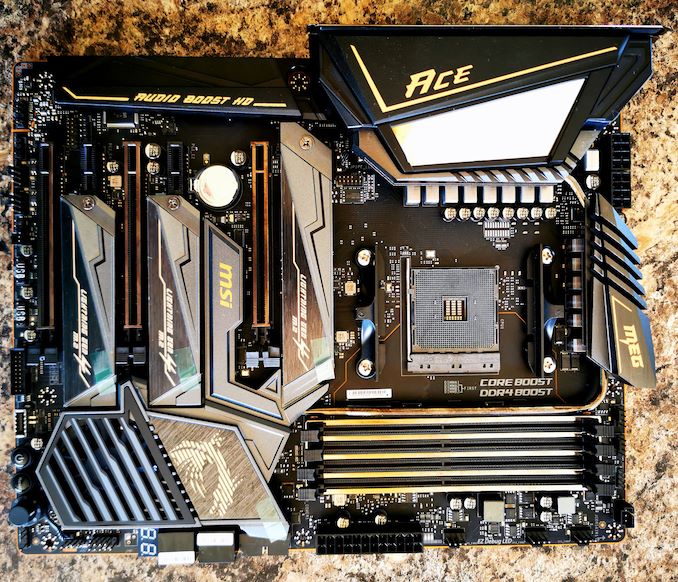
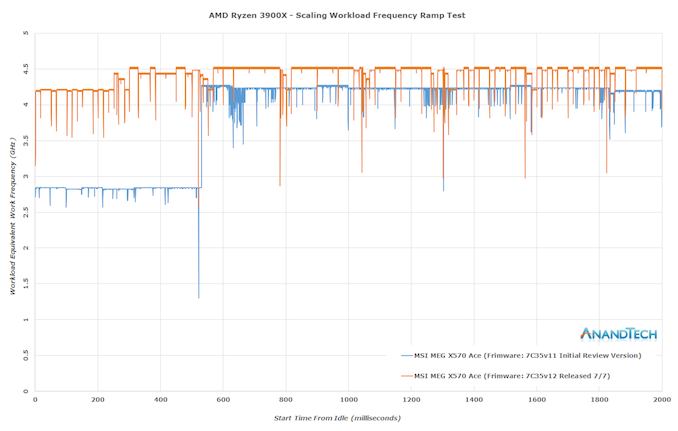








75 Comments
View All Comments
Maxiking - Sunday, July 14, 2019 - link
No, it is called false advertising. As I said, a large number of those cpus can not reach 4.6ghz on a single core because the silicone quality is poor.They specifically chose to use such boosts /12core, 16 core - 4.6 and 4.7 ghz/ to confuse people, so they could assume the cpus would be able to reach the frequency on all cores after overclocking. The fact is the node is so poor, it barely reaches 4.3 ghz on a few chips and often with voltage over the limit.
Recently AMD claimed that had jebaited Nvidia. It is ridiculous when you think about it. They use a 7nm node yet their architecture is so terrible, they can't beat a gpu from 2016, 1080ti and and competing with mid range Nvidia cards.
So yeah, this is the one and only successful jebait from AMD, the false boosts.
Korguz - Sunday, July 14, 2019 - link
then WHERE is the proof ?? and i dont mean forum posts by random people. i mean actual articles on reputable sites that are showing this. which so far, you have shown NONE, there fore, YOU are the FRAUD, and are just trying to spread BS and are tolling. either post links to REPUTABLE sites, or shut up and drop this.Maxiking - Sunday, July 14, 2019 - link
So this site isn't reputable?I already mentioned plenty of sites which weren't able to fully utilize the boost freq. Yet I am always being told by the fanboys that bios patches will change that. So far, a second test on this site and proving my words, again no boost to 4.6ghz on a single core. There is a graph. Look at it.
You know, being a fanboy doesn't make things better, companies don't care about. You sure know that, right.
Korguz - Sunday, July 14, 2019 - link
this site is reputable, and as i said before, teething issues with a new platform, and with an updated bios, even your mighty intel has has the same types of issues over the years and issues look to be fixed, and i bet, after a few more updates, things will get better, hardly any reason to accuse a company for fraud or miss advertising, but by all means, file a law suit against amd for this, lets see how far you get.the only thing you mentioned.. were FORUMS, not articles posted by the sites operators, BIG difference, a forum, is random people, who are usually not part of the sites staff, vs an article published on the site, written by someone who runs the site. Maxiking, YOU seem to be the ONLY only one complaining on this site about this. you want to call me a fanboy, go ahead, but i hope YOU know, that you also come across to me, as some one who wants to make a big deal out of something, where there is NO REASON TO. if amd did not do anything to fix this supposed issue in a timely matter, then maybe there is a reason to cry fraud and miss advertising, but it looks like they are taking steps to fix this as soon as they are able to find and implement a fix
Maxiking - Monday, July 15, 2019 - link
You are a typical fanboy, I didn't mention Intel once unless you tried it to force into the discussion.So let me tell you it again, Intel doesn't have such issues and fraud marketing. If they mention turbo and its frequency, a single core under a single threaded task ALWAYS RUNS at such frequency.
It is different with AMD, because the node they use is terrible and in order to gain the boost clocks they have to push voltage over the safety limits 1.4 - 1.5 , that's why they boost in the short spikes I already described.
I mentioned forums and sites like techspot, gamer nexus and so on.
I am not gonna sue AMD, I don't buy their products, be it GPUs or CPUs.
You are a fanboy, you acknowledged the issue yet you try to soften it and blame the bios. The opposite is true, 4.6 GHz boost is a paper dragon and a big number of CPUs can't reach it because of the poor node.
This is a second test, it confirmed my words, nothing changed, period. Like always with AMD product, there always updates, be it Windows updates, scheduler updates, bios updates which are supposed to fix issues. And as always, those updates have fixed and will fix NOTHING. I wonder how dumb you have to be to believe this story again and again. Anyway, Amd confirmed my words on twitter in PR language and admitted to the fraud by saying that boost clock are not guaranteed even on a single core. So yeah, fraud. Bye
Retrofire - Monday, July 15, 2019 - link
I'm pretty mercenary on my hardware purchases, but I did violate my own rule and early-adopt a 3900X.I can say that my experiences with this AMD part align with your narrative. Of my 12 cores, six max out at 4.4ghz, four max at 4.3ghz, and two can only sustain 4.2ghz. Using PBO I have *never* see a boost to 4.6ghz, and *may* have hit 4.5ghz for a split second once.
This isn't due to running a stock cooler, or gimped BIOS, or lagging chipset drivers. There is no way any of my cores can sustain even 4.5ghz at safe voltage, much less 4.6ghz and you'll be able to knock me over with a feather if my intuition is proven wrong here and some magic bullet AGESA rev drops that changes this.
That said, I'm still very impressed with the chip overall. No, it doesn't overclock. No it doesn't quite hit its advertised specs, which will be a problem for AMD if they cannot engineer around the silicon and there's a class action.
At max clocks on all cores, I can hit a 7500 Cinebench R20 consistently at a safe voltage, and for multi-core that's nothing short of stunning out of a $500 part. I bench about 6% below a stock 9900K single-core, which doesn't bother me as I never game at low-resolution, and I'm GPU-bound 99% of the time anyway.
While the name-calling ultimately weakens his argument, Maxiking isn't wrong: It seems clear to me that AMD misrepresented the specifications around their new chip. I'll gladly take the performance gain and eat my words if they're able to fix this with microcode and drivers, because after four days of non-stop tweaking, there just doesn't appear to be any more headroom left on these parts to eke performance out of.
I would say this with much more chagrin if the 3900X wasn't performing as well as it does at the clocks it *can* hit.
Overall, this feels (initially) like an unforced error from AMD. They could have had all of the glory and much less of the negativity if they had lowballed their clock specs and provided room for overclocking.
Korguz - Tuesday, July 16, 2019 - link
um, intel doesnt have issues with fraud ??? um hello ? have you NOT sees the reports of intels use of TDP ? how they " claim " some their cpus use 95 watts, but in reality use up to 200 watts ? BTW, how is that intel cpu that you use ( as you state you dont use amd's products, so you must use intel ) i bet its probably not uses the watts intel " claims " i wonder how dumb YOU have to be to keep believing the lies and BS intel feeds you. so yea, NOT using the power your products claim, but using A LOT more, fraud also. good riddanceMaxiking - Monday, July 22, 2019 - link
You are uneducated, TDP doesn't mean power consumption but the amount of heat dissipated.Qasar - Tuesday, July 16, 2019 - link
um maxiking, why is it others have questioned you on this as well, but you ONLY seem to responding to Korguz ??? also WHY does it also seem like you don't acknowledge the negative aspects of intel ? you ONLY seem to be going after amd for faud, but you don't do the same for intel ? alufan pretty much said the faud that intel has done over the years, but you dont seem to see that ? the biggest one, seems to the the claimed watts their cpu's use, so i hope you have a cooler on your intel cpu, that can handle 30-50 more watts then the chip is rated for, you'll need it. seems to me.. you are NO better then he is, that sounds like and intel fan boy to me.Qasar - Sunday, July 21, 2019 - link
hmm no reply from maxiking, thought he wouldnt reply to that question. hes fine with accusing amd of fraud, but to accuse intel of the same, he wont do. figures